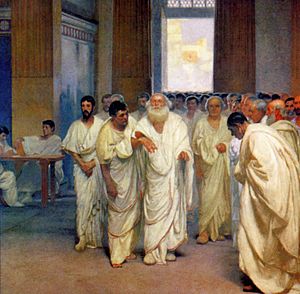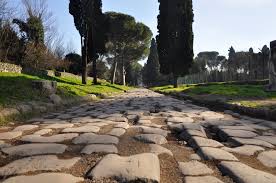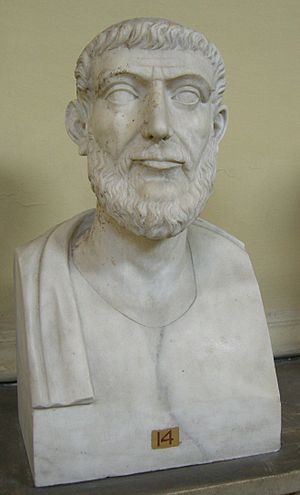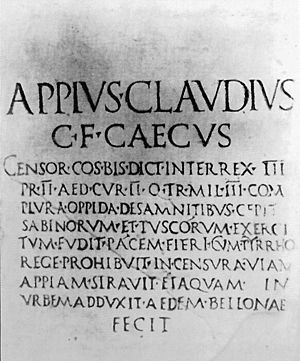Appius Claudius Caecus facts for kids

Appius Claudius Crassus Caecus ("the blind"; born around 340 BC – died after 280 BC) was a very important leader in the Roman Republic. He was active between 315 BC and 278 BC. He served as a censor (a powerful Roman official) from 312 to 308 BC. He was also a consul (like a top leader) twice, once in 307 BC and again in 296 BC. He even served as a dictator around 285 BC. Appius Claudius Caecus is special because he is one of the first Romans whose life historians can trace with good certainty.
Contents
Appius Claudius Caecus: A Roman Leader
Building Rome's Future
One of Appius Claudius Caecus's biggest achievements was during his time as censor. Even though this job was usually only for 18 months, he held it for five years! During this time, he started two huge building projects that changed Rome forever.
The Appian Way
He built the very first major Roman road, called the Via Appia. This road was incredibly important for moving soldiers and goods across Italy. It helped Rome become stronger and connect different parts of its growing territory.

The Aqua Appia
He also built the first aqueduct, called the Aqua Appia. An aqueduct is like a long bridge or channel that carries fresh water from far away into a city. This was a huge step for Rome, providing clean water for its people.

Important Political Changes
Appius Claudius Caecus also made several important changes to how Rome was governed. These changes were sometimes controversial, but they had a lasting impact.
Changing Roman Politics
As censor, he changed how Roman tribes (groups of citizens) were organized. He also allowed descendants of freed slaves to vote, which was a big deal at the time. He was also the first censor to create the official list of senators, who were powerful Roman politicians. These changes made the job of censor much more important than it had been before.
Facing Challenges
His new ideas and changes sometimes upset people because they broke old traditions. Appius Claecus had some strong disagreements with other powerful Roman families, especially the Fabii family. Some ancient writers, like Quintus Fabius Pictor, who was an early Roman historian and part of the Fabii family, wrote negative things about Caecus. Because of these different stories, historians today have many different ideas about what kind of leader he was. Some see him as a revolutionary, while others see him as a great reformer.
Images for kids
-
The first Roman road, the Via Appia. Via Appia within the ancient Minturno.
See also
 In Spanish: Apio Claudio el Ciego para niños
In Spanish: Apio Claudio el Ciego para niños
 | Dorothy Vaughan |
 | Charles Henry Turner |
 | Hildrus Poindexter |
 | Henry Cecil McBay |




